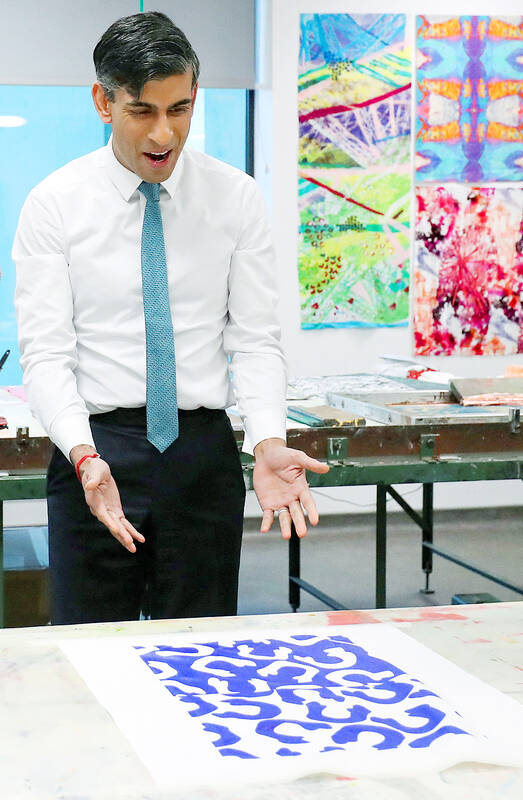British Prime Minister Rishi Sunak’s government should take steps to cut UK reliance on semiconductors from Taiwan because of the threat posed by China, a draft strategy said.
Chinese interference or an invasion of Taiwan would threaten Britain’s economy, according to the unpublished strategy seen by Bloomberg. That is because it would compromise supplies to and from Taiwan, which is home to more than 90 percent of the manufacturing capacity for all leading-edge chips, including the world’s pre-eminent silicon foundry, Taiwan Semiconductor Manufacturing Co (台積電).
The strategy is important because semiconductors are used in everything from cellphones to cars, and shortages have the potential to disrupt supply chains across the economy, as seen during the coronavirus pandemic in recent years. Moreover, frustrated by the government’s delay in spelling out its approach to the industry, companies are weighing their investments in the country.

Photo: AP
The document concluded that the supply of chips was an issue of major geopolitical and economic importance. It said that Britain should diversify with other sources of microchips from friendly and secure nations, while investing billions of pounds more in research and development.
However, Taiwan’s dominance means alternatives are not obvious, and scaling up the domestic industry would require billions of pounds of investment. In an effort to create sovereign silicon supplies, the US Chips Act has earmarked US$53 billion, while the EU could dedicate investments worth 43 billion euros (US$47 billion) in a bid to make 20 percent of the world’s chips.
The UK had not been considering subsidies close to that magnitude, the people said. The study said the government should back domestic specialisms, such as compound semiconductors, which are made of different materials to conventional silicon chips and are useful in electric vehicles, 5G wireless and other emerging technologies.

Photo: AFP
The government declined in a statement to comment on what it called “speculation,” saying the strategy will be published “in due course.”
The issue is being discussed as Sunak’s foreign policy advisor John Bew puts the finishing touches to a wider strategy known as the Integrated Review looking at Britain’s foreign and defense policy. Sunak, while not as hawkish on China as his predecessor Liz Truss, is expected to project more of the nation’s resources to the Indo-Pacific, in part to secure Taiwan’s future security from Beijing’s aggression.
UK government officials who drew up the paper also warned that Chinese-backed acquisitions of British chip businesses posed potential national security challenges. That is a concern the UK has already begun to address, with British Secretary of State for Business, Energy and Industrial Strategy Grant Shapps last year ordering Nexperia Holding BV’s Chinese owner to sell Newport Wafer Fab — Britain’s biggest microchip-component factory — unpicking a deal completed in 2021.
The government had committed to publishing a semiconductor strategy last year. It was finalized by former tech minister Chris Philp and officials in the first half of last year and was ready to be released in the summer, but was delayed due to the collapse of former British prime minister Boris Johnson’s government, people familiar with the plans said.
At a time when other governments and businesses were making major decisions in the wake of global chip supply shortages sparked by the coronavirus pandemic, Britain’s delay in publishing the strategy has fueled concerns over national security among officials, according to people familiar with the matter.
The delay has also left companies and investors in a frustrated limbo, with CEOs slamming Britain’s lack of planning and urging it to invest in the sector. They welcomed the indications from the draft strategy reported by Bloomberg, but pressed the government to finalize policies.
“While much still remains unclear, reports about the government’s strategy indicate that it has taken a sensible approach in backing the high-value parts of the industry where UK companies already lead and which will bring the most benefits to the wider economy,” said Americo Lemos, CEO of British-based compound semiconductor manufacturer IQE PLC. “Now we need swift and decisive action to ensure that the UK does not lose its place at the global top table.”
Simon Thomas, head of Paragraf, a British-based graphene-based electronics start-up which has threatened to move to the US, lamented UK foot-dragging over its semiconductor strategy.
“The government has been speaking a good game, but it has yet to produce any meaningful policy on supporting the semiconductor sector, whilst China, the US, Taiwan, [South] Korea and the EU have all come out with billion-dollar support plans and packages,” Thomas said by e-mail. “The UK cannot match those figures; however it can implement plans for a supportive, attractive environment for technology businesses where this country can take advantage of its pioneering, next-generation chip innovations.”

Taiwan Transport and Storage Corp (TTS, 台灣通運倉儲) yesterday unveiled its first electric tractor unit — manufactured by Volvo Trucks — in a ceremony in Taipei, and said the unit would soon be used to transport cement produced by Taiwan Cement Corp (TCC, 台灣水泥). Both TTS and TCC belong to TCC International Holdings Ltd (台泥國際集團). With the electric tractor unit, the Taipei-based cement firm would become the first in Taiwan to use electric vehicles to transport construction materials. TTS chairman Koo Kung-yi (辜公怡), Volvo Trucks vice president of sales and marketing Johan Selven, TCC president Roman Cheng (程耀輝) and Taikoo Motors Group

Among the rows of vibrators, rubber torsos and leather harnesses at a Chinese sex toys exhibition in Shanghai this weekend, the beginnings of an artificial intelligence (AI)-driven shift in the industry quietly pulsed. China manufactures about 70 percent of the world’s sex toys, most of it the “hardware” on display at the fair — whether that be technicolor tentacled dildos or hyper-realistic personalized silicone dolls. Yet smart toys have been rising in popularity for some time. Many major European and US brands already offer tech-enhanced products that can enable long-distance love, monitor well-being and even bring people one step closer to

New apartments in Taiwan’s major cities are getting smaller, while old apartments are increasingly occupied by older people, many of whom live alone, government data showed. The phenomenon has to do with sharpening unaffordable property prices and an aging population, property brokers said. Apartments with one bedroom that are two years old or older have gained a noticeable presence in the nation’s six special municipalities as well as Hsinchu county and city in the past five years, Evertrust Rehouse Co (永慶房產集團) found, citing data from the government’s real-price transaction platform. In Taipei, apartments with one bedroom accounted for 19 percent of deals last

RECORD-BREAKING: TSMC’s net profit last quarter beat market expectations by expanding 8.9% and it was the best first-quarter profit in the chipmaker’s history Taiwan Semiconductor Manufacturing Co (TSMC, 台積電), which counts Nvidia Corp as a key customer, yesterday said that artificial intelligence (AI) server chip revenue is set to more than double this year from last year amid rising demand. The chipmaker expects the growth momentum to continue in the next five years with an annual compound growth rate of 50 percent, TSMC chief executive officer C.C. Wei (魏哲家) told investors yesterday. By 2028, AI chips’ contribution to revenue would climb to about 20 percent from a percentage in the low teens, Wei said. “Almost all the AI innovators are working with TSMC to address the